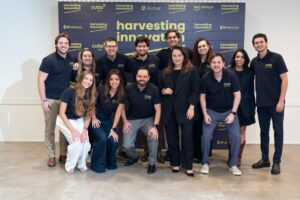Last week, the UK’s leading crop science facility Rothamsted Research hosted the first Rothamsted Open Innovation Forum (ROIF 2017). The aim of the event was to foster collaboration between industry, research, and the agritech startup community to solve agriculture’s biggest challenges.
The forum will be posting content from the event online, but first, here are three main takeaways from the event for your consideration.
1. How to push ahead with the agritech agenda
The Rothamsted Open Innovation Forum (ROIF) attracted around 250 delegates, mainly from the UK and Europe, plus a few highly-focused business and scientific leaders from Pakistan, Australia, South Africa, Singapore and the US.
Three days of listening to 25 different speakers, each with their own ‘we can feed the world with this’ solution, communicated that there are plenty of answers out there to be addressed by individual farmers and businesses in their own search for agritech progress.
The big question, as always, is which developments to follow and which to ignore. There are always people in the room, after all, who backed the wrong mobile phone system, TV supplier, or digital format, often on the best possible advice available at the time.
One simple ROIF message was, don’t worry about your mistakes. You’re bound to make plenty on the way to finding the answer that takes you forward. That also applies to the people you employ.
“Everyone in every organization should have a game-changer in their business, even if it’s just one individual who is a radical, maybe almost a renegade,” said Michael Ruggier, CEO of tech consultancy GameChanger Technologies. “Don’t fire these people, just help them, give them money and nurture them and then leave them alone to come up with something creative.”
Having already completed a 24-year career of ‘turning radically novel ideas into reality’ with Shell International, Ruggier described GameChanger Technologies as a business which is stuffed with ‘rags-to-riches’ stories. He duly urged delegates to have a bit of courage in addressing their own development ambitions.
George Freeman MP, chair of the UK Prime Minister’s Policy Board, opened the day arguing that the UK is in a strong position to push forward the agritech tech agenda globally. He argued that UK scientists and technologists should pick two or three milestones to reach, such as desert-thriving crops, and when successful, these will promote the whole agritech ecosystem and attract new talent to the country. He likened it to the effect landing on the moon had for the US technology sector.
GameChanger’s Ruggier also challenged the audience to do something different with their innovative commitment, urging them to get involved in ‘white space’ areas rather than settling for tried and tested territories. “Don’t just try to come up with another app that everyone else is working on,” he said. “It’s pathetic to do that; you’re all just competing in the same space.”
In turn, delegates asked Ruggier how farmers could adopt disruptive innovation in an environment that traditionally finds it hard to adapt at pace.
“It is difficult to do it on your own, although it has been done by certain individuals, such as the developer of the first Airponix aeroponics system which cost £850 ($1,070) and took two weeks to build,” said Ruggier. “More usually, I think you need to focus on helping the innovators, the radical people, enabling them to see your farming needs, while ensuring they have the necessary funding and support to deliver for you.
“Having said that, if you really think your idea is going to work then go for it. Spend your money and try to do something radical on your own. But beware that it usually takes a lot of time and money when you do that.”
2. The importance of communicating with consumers
For Bayer’s head of research and development, Bernard Leroux, one of the biggest challenges facing the agritech sector at present is to ensure social acceptance of modern crop protection technologies and genetic modification.
“I think we can be proud of what has been achieved over the last 30-40 years in our delivery of quality food solutions to people,” he said.
In seeking to continue moving forward, however, he warned that global agriculture must face up to several current issues relating to pesticides, herbicides, biodiversity concerns, soil structure changes and water resources.
“These things are bringing a lot of criticism against agriculture,” said Leroux, adding that while there is a public recognition of the link between science and medicine, the same public recognition does not apply to the link between science and agriculture.
“We need to address this, as agricultural science will be needed even more in the future. There is an obligation on us, therefore, to talk to people about what we do and how we are seeking to create a better future.”
That meant talking directly to consumers and also to those operating the global food chain. It also meant talking to politicians, whose reactions to a food scare, of one type or another, were often ‘quite brutal’ resulting in even more constraints on industry developers.
“We have to make our science more transparent; not only in talking about what we do but also making it more understandable when we have something to communicate,” Leroux argued.
“In addition, we need to create a vision for the work we do, much of which has a very long time-frame, which could be as long as 15-20 years. If we do not communicate our vision for what may be possible in the end, then it is very difficult for people to support what we are doing.
“In 1987, for example, Steve Jobs released an internal video in which he described the iPad of today, with all its functionality. It looked like science fiction at the time, but it created an image or possibility that actually led the company to deliver on his vision. We need to inspire ourselves in a similar way.”
3. Embracing Open Innovation in agriculture
Open innovation is a way of driving new thinking by engaging a broad community to develop solutions to specific problems. It is an alternative to the traditional method of hiring staff to deal with problems in-house. In some circles, it’s known as crowdsourcing and can involve offering a monetary reward to the individual or team that successfully meets the problem requirements.
With so many problems to be answered in agriculture, open innovation is key to development, but a clear takeaway from ROIF is that they are many ways of looking at OI and with them various challenges.
These include making sure sensitive information stays private, keeping on top of intellectual property issues, and realizing that your ultimate profits might be diluted.
The short answer is you have to trust each other. That’s also the long answer, of course, only with a few more ifs and buts thrown in.
Dr Christian Witt from the Bill and Melinda Gates Foundation summed it up best with his final presentation image, which featured a baby wrapped in a multicolored shawl. Alongside the picture was the comment: “The work is complicated. Why we do it, is not.”
Asked to explain what OI means in practice, Wim van Haverbeke, professor of strategy and innovation management at Hasselt University in Belgium, said the founding principle of collaborative working should be to have complementary partners, rather than competitive ones. He also said it was important to separate commercial activities from thematic development.
While you’d expect Witt and van Haverbeke to be OI devotees, the more surprising aspect of ROIF was to learn how businesses such as Bayer and Syngenta are also embracing OI, both within their own businesses and throughout the wider industry.
“It’s a big mindset change,” said Adrian Percy, head of research and development at Bayer Crop Science. “But it is such an exciting time to be in agritech: An explosion in science is driving OI. In addition, we’re moving from delivering products to delivering systems and solutions to growers, so there is more need to work with other businesses.”
GlaxoSmithKline’s director of academic liaison, Malcolm Skingle, also revealed how GSK is using OI to tackle major medical challenges such as malaria and TB in African countries.
“These are hard questions, and we have to do it in partnership,” he said. “It is also the right thing to do.”
Jeni Tennison from Open Data Institute in the US said that when it comes to data, the potential to drive efficiencies and speed up scientific development through OI is ‘tremendous.’ She also added, however, that setting the framework of how data can be used and shared is vital to protect sensitive information while still sharing as openly as possible to benefit the wider industry.
The need to agree on a policy on the treatment of intellectual property for OI developments was equally important, said Simon O’Brien, patent attorney at D Young & Co, adding that working with mutual trust and benefit is the key to successful joint innovation, backed up with ultimate commercial success for both parties.
What do you think? We want to hear from you! Email [email protected]
More soundbites from ROIF 2017:
Matthew Ryan, curator of the Genetic Resource Collection at the Centre for Agriculture and Biosciences International (CABI): “Science may be the key to unlocking improved yields with lower inputs.”
Angela Karp, director of Science Innovation, Engagement and Partnership at Rothamsted Research: “Open Innovation is all about partnerships. There is a real need for us to pull together to tackle some of these big issues. We need a strategy and an action plan, and we are delighted that ROIF has helped to facilitate this.”
Jeni Tennison from the Open Data Institute: “When it comes to data, the potential to drive efficiencies and speed up scientific development is tremendous. Our economy is becoming driven by data: Information is the founding point on which all other things can be built. Setting the framework of how data can be used and shared is vital, though, to protect sensitive information while still sharing as openly as possible to benefit the wider industry.”
Katrin Burt, managing director of Syngenta Ventures: “You need to get connected with the right people; it’s a marriage rather than a date, and you need to have trust and respect among the people you’re working with.”
Roland Harwood, founder of 100% Open: “There is no substitute for bold ambition and sheer hard graft. We are also just one conversation away from pretty much everything and anything.”
Dr Christian Witt from the Bill and Melinda Gates Foundation: “We want farmers to be empowered with the knowledge, tools, and technologies to improve their livelihoods and lift themselves out of poverty.” Witt specifically referred to the potential for smartphones, the internet, and open access to data to help nations move from subsistence farming to more productive, profitable systems.
Chris Dunkley, chief executive of the Rothamsted Centre for Research and Enterprise: “Unlike many other conferences, ROIF will follow projects through to their implementation, ensuring real changes on the ground.”





